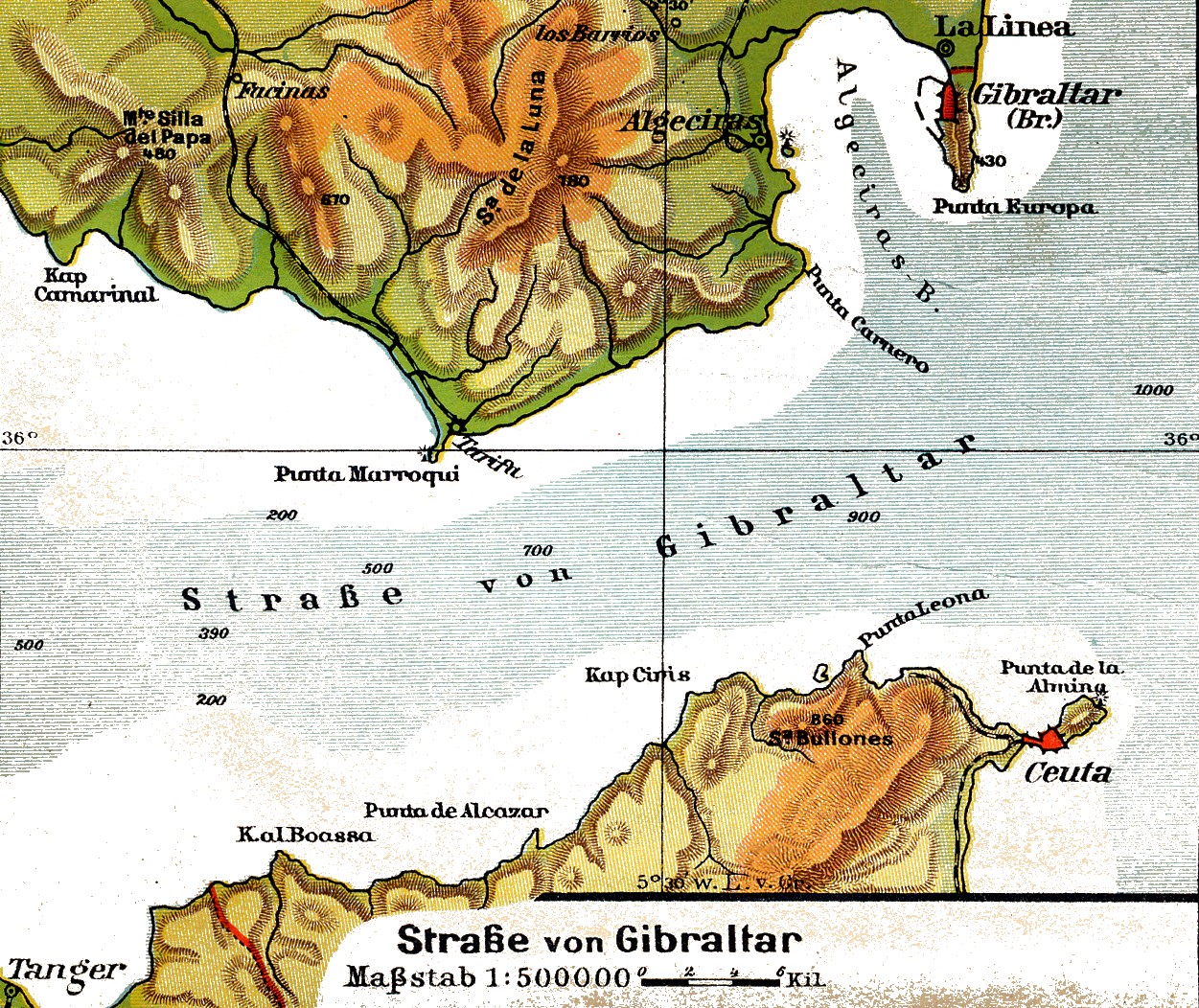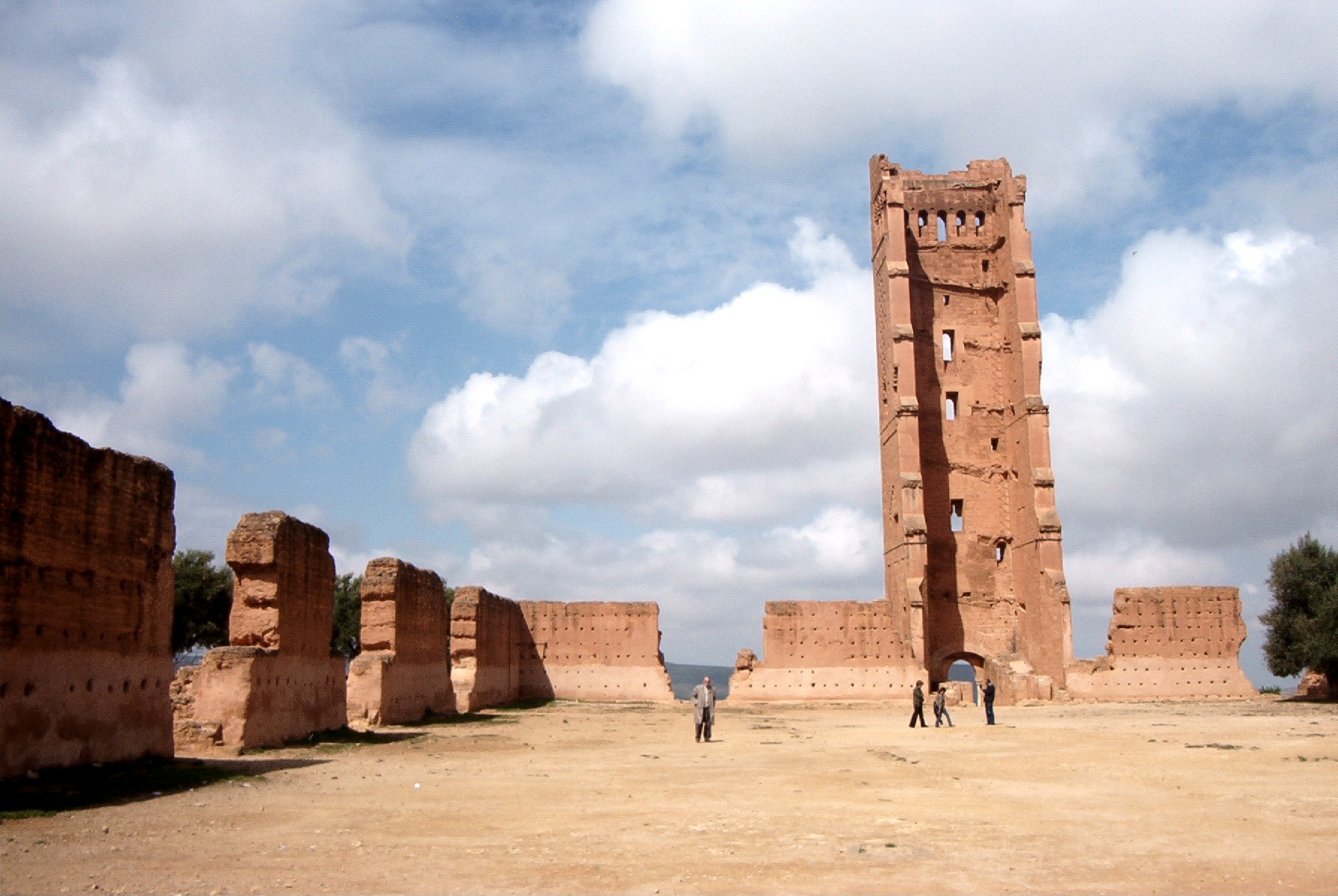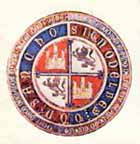|
Abu Al-Hasan Ali Ibn Othman
Abu Al-Hasan 'Ali ibn 'Othman ( – 24 May 1351), () was a sultan of the Marinid dynasty who reigned in Morocco between 1331 and 1348. In 1333 he captured Gibraltar from the Castilians, although a later attempt to take Tarifa in 1339 ended in fiasco. In North Africa he extended his rule over Tlemcen and Hafsid Ifriqiya, which together covered the north of what is now Algeria and Tunisia. Under him the Marinid realms in the Maghreb briefly covered an area that rivalled that of the preceding Almohad Caliphate. However, he was forced to retreat due to a revolt of the Arab tribes, was shipwrecked, and lost many of his supporters. His son Abu Inan Faris seized power in Fez. Abu Al-Hasan died in exile in the High Atlas mountains. Early years Abu al-Hasan was the son of Marinid ruler Abu Sa'id Uthman II. Al-Baydhaq says that his mother was a woman from Fez called Fatima. It is unknown whether she was a wife or a concubine. He had a dark complexion inherited from his Abyssinian m ... [...More Info...] [...Related Items...] OR: [Wikipedia] [Google] [Baidu] |
Marinid Sultanate
The Marinid dynasty ( ) was a Berbers, Berber Muslim dynasty that controlled present-day Morocco from the mid-13th to the 15th century and intermittently controlled other parts of North Africa (Algeria and Tunisia) and of the southern Iberian Peninsula (Spain) around Gibraltar. It was named after the Banu Marin (, Berber languages, Berber: ''Ayt Mrin''), a Zenata, Zenata Berber tribe. It ruled the Marinid sultanate, founded by Abd al-Haqq I.C.E. Bosworth, ''The New Islamic Dynasties'', (Columbia University Press, 1996), 41-42. In 1244, after being at their service for several years, the Marinids overthrew the Almohad Caliphate, Almohads which had controlled Morocco. At the height of their power in the mid-14th century, during the reigns of Abu al-Hasan Ali ibn Othman, Abu al-Hasan and his son Abu Inan Faris, Abu Inan, the Marinid dynasty briefly held sway over most of the Maghreb including large parts of modern-day Algeria and Tunisia. The Marinids supported the Emirate of Grana ... [...More Info...] [...Related Items...] OR: [Wikipedia] [Google] [Baidu] |
Almohad Caliphate
The Almohad Caliphate (; or or from ) or Almohad Empire was a North African Berbers, Berber Muslim empire founded in the 12th century. At its height, it controlled much of the Iberian Peninsula (Al-Andalus) and North Africa (the Maghreb). The Almohad movement was founded by Ibn Tumart among the Berber Masmuda tribes, but the Almohad caliphate and its ruling dynasty, known as the Mu'minid dynasty, were founded after his death by Abd al-Mu'min. * Around 1121, Ibn Tumart was recognized by his followers as the Mahdi, and shortly afterwards he established his base at Tinmel in the Atlas Mountains. Under Abd al-Mu'min (r. 1130–1163), they succeeded in overthrowing the ruling Almoravid dynasty governing the western Maghreb in 1147, when he conquered Marrakesh and declared himself caliph. They then extended their power over all of the Maghreb by 1159. Al-Andalus followed, and all of Muslim Iberia was under Almohad rule by 1172. The turning point of their presence in the Iberian Pe ... [...More Info...] [...Related Items...] OR: [Wikipedia] [Google] [Baidu] |
Abd Al-Malik Abd Al-Wahid
Abu Malik Abd al-Wahid () (died 1339) (also known as ''Abomelique'') was a son of the Marinid sultan of Morocco, Abu al-Hasan Ali ibn Othman. Although he had lost an eye, Malik was a capable military commander and served as governor of Algeciras and the Marinids' principal general in Al Andalus. He captured Gibraltar from Castile in June 1333 and participated in his father's campaign against rebels in the Kingdom of Tlemcen the following year. He was killed by Castilian forces in 1339 after being ambushed on the way back from a raid against the Castilian-held town of Jerez de la Frontera. Capture of Gibraltar Abu Malik Abd al-Wahid's role in Al Andalus began in 1332 when the newly crowned Abu al-Hasan responded to an appeal from Muhammed IV, the Nasrid Sultan of Granada, for assistance against Castile by sending his son and an army to help the Granadans. During 1332, Abu Malik oversaw the transportation of a force of some 7,000 men from Morocco to Algeciras. They marched on the ... [...More Info...] [...Related Items...] OR: [Wikipedia] [Google] [Baidu] |
Algeciras
Algeciras () is a city and a municipalities in Spain, municipality of Spain belonging to the province of Cádiz, Andalusia. Located in the southern end of the Iberian Peninsula, near the Strait of Gibraltar, it is the largest city on the Bay of Gibraltar (). The Port of Algeciras is List of busiest ports in Europe, one of the largest ports in Europe and the world in three categories: List of world's busiest container ports, container, List of world's busiest ports by cargo tonnage, cargo and transshipment. The urban area straddles the small Río de la Miel, which is the southernmost river of continental Europe. As of 1 January 2020, the municipality had a registered population of 123,078, second in its province after Jerez de la Frontera and greater than Cádiz city population. It forms part of the Comarcas of Spain, ''comarca'' of Campo de Gibraltar. The surrounding metro area also includes the municipalities of Los Barrios, La Línea de la Concepción, Castellar de la Frontera ... [...More Info...] [...Related Items...] OR: [Wikipedia] [Google] [Baidu] |
Muhammed IV, Sultan Of Granada
Abu Abdullah Muhammad ibn Ismail (), also known as Muhammad IV (14 April 131525 August 1333), was the ruler of the Emirate of Granada on the Iberian Peninsula from 1325 to 1333. He was the sixth Sultan of the Nasrid dynasty, succeeding to the throne at ten years old when his father, Ismail I of Granada, Ismail I (), was assassinated. The initial years of his reign were marked by conflict among his ministers, who vied for control of the young sultan's government. This escalated into a civil war between the party of the vizier Muhammad ibn al-Mahruq and that of the powerful commander of the Volunteers of the Faith, Uthman ibn Abi al-Ula. Uthman declared Muhammad's uncle, Muhammad ibn Faraj, as a rival sultan and secured support from Alfonso XI of Castile (), Granada's Christian neighbour to the north. Muhammad IV requested help from Abu Said Uthman II () of the Marinid Sultanate in Morocco and gave him territories in the Iberian Peninsula, including Ronda, Marbella, and Algeciras ... [...More Info...] [...Related Items...] OR: [Wikipedia] [Google] [Baidu] |
Nasrid Dynasty
The Nasrid dynasty ( ''banū Naṣr'' or ''banū al-Aḥmar''; ) was an Arab dynasty that ruled the Emirate of Granada from 1232 to 1492. It was the last Muslim dynasty in the Iberian Peninsula. Twenty-three sultans ruled Granada from the founding of the dynasty in 1232 by Muhammad I of Granada, Muhammad I until 1492, when Muhammad XII of Granada, Muhammad XII surrendered all lands to Isabella I of Castile. Today, the most visible evidence of the Nasrid dynasty is the Alhambra palace complex built under their reign. Historical background The dynasty founded by Muhammad I of Granada held a territory that included Granada, Province of Jaén (Spain), Jaén, Almería, and Málaga. Valencia, Játiva, and Jaén were conquered by Christians during the campaigns of the Reconquista and for the most part, the Nasrids were made into tribute-paying vassals from 1243. Granada continued as a center of Islamic culture. The Nasrids later formed alliances with the Marinids of Morocco. Nasri ... [...More Info...] [...Related Items...] OR: [Wikipedia] [Google] [Baidu] |
Emirate Of Granada
The Emirate of Granada, also known as the Nasrid Kingdom of Granada, was an Emirate, Islamic polity in the southern Iberian Peninsula during the Late Middle Ages, ruled by the Nasrid dynasty. It was the last independent Muslim state in Western Europe. Muslims had been present in the Iberian Peninsula, which they called Al-Andalus, since 711. By the late 12th century, following the Reconquista, expansion of Christian kingdoms in the north, the area of Muslim control had been reduced to the southern parts of the peninsula governed by the Almohad Caliphate. After Almohad control retreated in 1228, the ambitious Muhammad I of Granada, Muhammad I Ibn al-Ahmar rose to power and established the Nasrid dynasty in control of a sizeable portion of this territory, roughly corresponding to the modern Spanish provinces of Province of Granada, Granada, Province of Almería, Almería, and Province of Málaga, Málaga. By 1250, the Nasrid emirate was the last independent Muslim polity in the pe ... [...More Info...] [...Related Items...] OR: [Wikipedia] [Google] [Baidu] |
Ferdinand IV Of Castile
Ferdinand IV of Castile (6 December 1285 – 7 September 1312) called the Summoned (''el Emplazado''), was King of Castile and King of León, León from 1295 until his death. Ferdinand's upbringing and personal custody was entered to his mother Queen María de Molina, however, he was tutored by his granduncle Henry of Castile the Senator. Queen María attempted to placate the nobility, confronted her son's enemies, and repeated prevented her son from being dethroned. He faced the insubordination of the nobility, led at numerous times by his uncle John of Castile, Lord of Valencia de Campos, and by Juan Núñez II de Lara, who were sometimes supported by another royal relative, Juan Manuel, Prince of Villena. Like his predecessors on the throne, Ferdinand IV continued the Reconquista and, although he failed to conquer Algeciras in 1309, he captured the city of Gibraltar that same year. In 1312 the city of Alcaudete was also conquered. During the Cortes of Valladolid of 1312, he p ... [...More Info...] [...Related Items...] OR: [Wikipedia] [Google] [Baidu] |
Lange Diercke Sachsen Europaeische Landschaften Gibraltar
Lange may refer to: People * Lange (surname), a German surname * David Lange (1942–2005), 32nd Prime Minister of New Zealand * Lange (musician) (born 1974), British DJ * Lange (Brazilian footballer) (born 1966), Brazilian footballer Companies * Lange (ski boots), a producer of ski boots used in alpine (downhill) skiing * Lange Aviation, manufacturer of gliders * Lange Textbooks, an imprint of McGraw-Hill Education * A. Lange & Söhne, watchmakers Places * Lange (crater), a crater on Mercury * Lange Island, Bastian Islands * Lange Peak, Antarctica * Lange, Estonia, village in Haaslava Parish, Tartu County, Estonia * Lange, Western Australia * Langhe, a region in Piedmont, Italy * Lange, a tributary of the Oker in Germany * ''Lange Eylant'', the Dutch term for Long Island Long Island is a densely populated continental island in southeastern New York (state), New York state, extending into the Atlantic Ocean. It constitutes a significant share of the New York m ... [...More Info...] [...Related Items...] OR: [Wikipedia] [Google] [Baidu] |
Tlemcen
Tlemcen (; ) is the second-largest city in northwestern Algeria after Oran and is the capital of Tlemcen Province. The city has developed leather, carpet, and textile industries, which it exports through the port of Rachgoun. It had a population of 140,158, as of the 2008 census. A major centre of the Medieval Muslim Algeria, Central Maghreb, the city is a mix of Arabs, Arab, Berbers, Berber, al-Andalus, 'Āndalusī, Ottoman Empire, Ottoman, and Western influence on Africa, Western influences. From this mosaic of influences, the city derives the title of capital of Andalusian art in Algeria. Various titles are attributed to the city including "the Pearl of the Maghreb", "the African Granada" and "the Medina of the West". Etymology The name Tlemcen (''Tilimsān'') was given by the Zayyanid King Yaghmurasen Ibn Zyan. One possible etymology is that it comes from a Berber languages, Berber word ''tilmas'' 'spring, water-hole', or from the combination of the Berber words ''tala'' 'fou ... [...More Info...] [...Related Items...] OR: [Wikipedia] [Google] [Baidu] |
Zayyanid Dynasty
The Zayyanid dynasty or Ziyanids (, ''Ziyāniyyūn'') or Abd al-Wadids (, ''Bānu ʿAbd āl-Wād'') was a Berber Zenata dynasty that ruled the Kingdom of Tlemcen, mainly in modern Algeria centered on the town of Tlemcen in northwest Algeria. The Zayyanid dynasty's rule lasted from 1235 to 1557. History On the collapse of the Almohad Caliphate's rule around 1236, the Kingdom of Tlemcen became independent under the rule of the Zayyanids, and Yaghmurasen Ibn Zyan. Ibn Zyan was able to maintain control over the rival Berber groups, and when faced with the outside threat of the Marinids, he formed an alliance with the Sultan of Granada and the King of Castile, Alfonso X. After an eight-year siege of Tlemcen by the Marinids that ended in 1307, the reigns of Abu Hammu I (r. 1308–1318) and Abu Tashufin I (r. 1318–1337) marked a second political apogee of the Zayyanids with a consolidated hold over the central Maghreb. This period of strength was followed by a Marinid oc ... [...More Info...] [...Related Items...] OR: [Wikipedia] [Google] [Baidu] |
Hafsids
The Hafsid dynasty ( ) was a Sunni Muslim dynasty of Berber descentC. Magbaily Fyle, ''Introduction to the History of African Civilization: Precolonial Africa'', (University Press of America, 1999), 84. that ruled Ifriqiya (modern day Tunisia, western Libya, and eastern Algeria) from 1229 to 1574. The dynasty was founded by Abu Zakariya Yahya, who was initially appointed governor of the region by the Almohad caliph before declaring his independence. Under the reigns of Abu Zakariya and his successor, al-Mustansir (), the Hafsids consolidated and expanded their power, with Tunis as their capital. After al-Mustansir's death, internal conflicts resulted in a division between an eastern branch of the dynasty ruling from Tunis and a western branch ruling from Béjaïa and Consantine. A reunification took place under Abu Yahya Abu Bakr II (), but his death was followed by another crisis during which the Marinids, based in present-day Morocco, invaded briefly. Eventually, unity w ... [...More Info...] [...Related Items...] OR: [Wikipedia] [Google] [Baidu] |






